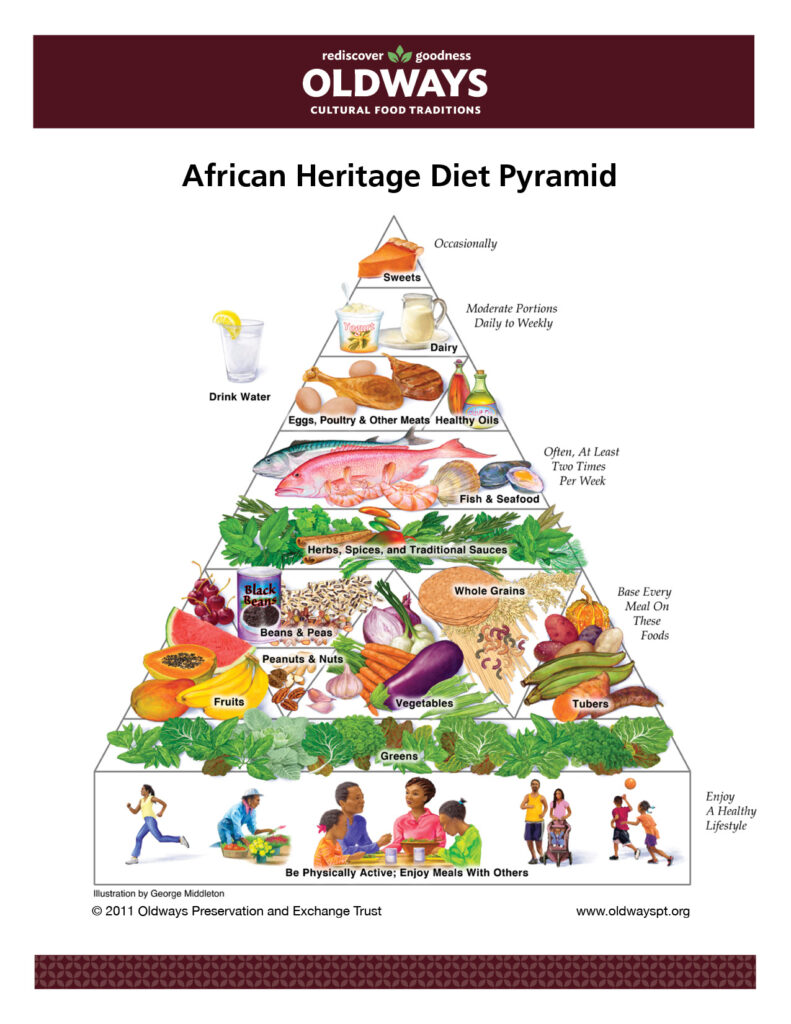In recent years, there has been a growing awareness of the impact of diet on overall health, with various studies emphasizing the role of unprocessed plant-based foods in preventing and even reversing conditions like type 2 diabetes. One such dietary pattern gaining recognition is the African Heritage Diet, rooted in the rich cultural and culinary traditions of the African continent and its diaspora. At Yaah! we explore the key benefits of adopting the African Heritage Diet, drawing parallels with the widely acclaimed Mediterranean diet and shedding light on its potential to foster optimal health.

Studies have indicated that a diet high in unprocessed plant foods and low in meat can reverse the majority of type 2 diabetes cases. The African Heritage Diet stands out for featuring some of the most nutrient-dense foods found on the continent, treasured by the diaspora. Rich in fiber, antioxidants, vitamins, and essential nutrients, these unprocessed foods play a crucial role in preventing and managing diseases. Now, let’s take a stroll down the aisles and explore the diverse shopping list recommended by the African Heritage Diet, ensuring a broad spectrum of nutrients and flavors that contribute to health outcomes associated with longevity and increased vitality.
Beet greens, callaloo, collard greens, turnip greens, kale, spinach, watercress, dandelion greens, mustard greens and cassava leaves
Asparagus, beets, Brussels sprouts, broccoli, carrots, eggplant, garlic, onions, pepper, okra, squashes, jicama and green beans
Baobab (or baobab powder), bananas, plantains, blackberries, blueberries, avocado, figs, guava, lemons, mangoes, oranges, plums and watermelon
Cassava, potatoes, sweet potatoes, yams and yuca
Amaranth, barley, couscous, fonio, maize, corn, millet, rice, sorghum, teff and wild rice
Black-eyed peas, broad beans, butter beans, chickpeas, cowpeas, kidney beans, lentils, lima beans and pigeon peas
Benne (or sesame) seeds, Brazil nuts, cashews, coconuts, peanuts, groundnuts, pecans, pumpkin seeds and sunflower seeds
Cider vinegar, annatto, arrowroot, bay leaf, cinnamon, cilantro, cloves, coconut milk, dill, ginger, mustard, nutmeg and paprika
Catfish, cod, crayfish, dried fish, mackerel, mussels, oysters, prawns, trout, sardines, shrimp and tuna
Chicken, eggs, beef, lamb, goat, and turkey
Coconut oil, olive oil, palm oil, peanut oil, sesame oil and shea butter
Buttermilk, yogurt, almond milk, rice milk and soymilk.
The African Heritage Diet encourages the inclusion of a diverse range of foods in your shopping list, including leafy greens, vegetables, fruits, tubers, whole grains, beans, nuts, seeds, herbs, spices, fish, seafood, poultry, eggs, meat, oils, dairy, and minimal sweets. This diversity ensures a broad spectrum of nutrients and flavors, contributing to health outcomes associated with longevity and increased vitality.
Heart Health
The African Heritage Diet is rich in monounsaturated fats derived from sources like peanuts, avocados, nuts, and seeds. Additionally, omega-3 fats, crucial for heart health and mental function, are found in abundance in foods such as amaranth leaves, baobab fruit and seeds, and cabbage. These fats contribute to reducing bad cholesterol while increasing good cholesterol, providing significant health benefits. Moving beyond heart health, let’s venture into the world of probiotics and digestive health.
Probiotics and Digestive Health

Fermented foods from plant and dairy sources, integral to the African Heritage Diet, contain probiotics—healthy bacteria essential for digestion and overall wellbeing. These friendly bugs offer numerous benefits, including optimal nutrient absorption, blood sugar balance, and allergy offsetting, further reinforcing the health-promoting aspects of the diet.
Disease Prevention
Rural African diets boast an impressive array of legumes such as bambara nuts, kidney beans, peanuts, cowpeas, beans, pigeon peas, and black-eye beans. High legume consumption has been linked to a lower risk of various diseases, aligning with the low rates of chronic illnesses observed in populations following both Mediterranean and rural African diets.
The African Heritage Diet Pyramid
Crafted by Oldways, the African Heritage Diet Pyramid offers a practical guide to adopting this dietary pattern. Unlike conventional food pyramids, it reflects the relative amounts of foods that should comprise a typical diet over time. Plant-based foods form the base, with moderate inclusion of poultry, eggs, meat, fish, seafood, dairy, and healthy oils. Sugary desserts are placed sparingly at the top.

While the Mediterranean diet has been widely celebrated for its health benefits, it shares striking similarities with rural African diets. Both emphasize the consumption of a variety of fruits, vegetables, and grains, with a minimal focus on meat. The African Heritage Diet Pyramid offers a visual representation of the recommended dietary patterns over time, highlighting the importance of plant-based foods. Its emphasis on unprocessed, plant-based foods, along with key features shared with the Mediterranean diet, underscores its potential to prevent and manage various health conditions. By embracing the African Heritage Diet, we can nourish our bodies, honor cultural legacies, and embark on a journey toward longevity and vitality.
Leave a Reply